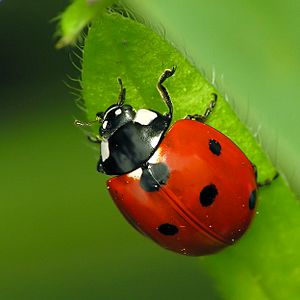Seven-spot ladybird facts for kids
Quick facts for kids Seven-spot ladybird |
|
|---|---|
 |
|
| Scientific classification |
|
| Kingdom: | Animalia |
| Phylum: | Arthropoda |
| Class: | Insecta |
| Order: | Coleoptera |
| Family: | Coccinellidae |
| Genus: | Coccinella |
| Species: |
C. septempunctata
|
| Binomial name | |
| Coccinella septempunctata (Linnaeus, 1758)
|
|
| Script error: The function "autoWithCaption" does not exist. | |
Script error: No such module "Check for conflicting parameters".
The seven-spot ladybird (also called seven-spotted ladybug in North America) is a very common beetle. It's known for its bright red wings with seven black spots. This ladybird is a carnivorous insect, meaning it eats other small creatures. It originally comes from Europe and Asia, but you can now find it in many parts of the world. Its scientific name, Coccinella septempunctata, comes from Latin words meaning "seven" and "spot."
Contents
About the Seven-Spot Ladybird
What They Eat
Seven-spot ladybirds are important helpers in gardens and farms. Both the young ladybirds (called larvae) and the adult ladybirds mainly eat tiny insects called aphids. Aphids can harm plants, so ladybirds help keep plants healthy. They also eat other small insects like whiteflies and the eggs and young of some other beetles and butterflies. Sometimes, they even eat pollen and nectar from flowers.
Where They Live
These ladybirds can live in many different places. They are usually found wherever there are aphids for them to eat. This includes meadows, fields, parks, gardens, and different types of forests.
Life Cycle and Winter
Seven-spot ladybirds usually have one or two groups of babies (generations) each year. When winter comes, the adult ladybirds find warm places to sleep. They might hide in leaves on the ground, under tree bark, or under rocks.
How They Protect Themselves
An adult seven-spot ladybird is about 7 to 13 millimeters long. Their bright colors and spots are a warning sign to animals that might want to eat them. This is called aposematism. It means they are telling predators, "I taste bad!"
If a ladybird feels threatened, it can do a few things. It might pretend to be dead. It can also release a bad-tasting liquid from its legs. This liquid makes them taste awful to predators. The ladybird makes its own special chemicals that are toxic. The size of their spots and how bright their colors are can even show how toxic they are!
Where Seven-Spot Ladybirds Are Found
You can find the seven-spot ladybird in many places around the world. They live across Europe, North Africa, and parts of Asia, including China, Japan, and India. They are also found in Australia.
Ladybirds and Humans
Helping Farmers
Seven-spot ladybirds are very useful to humans. People have brought them to new places, like North America, to help control pests. They are used as a natural way to get rid of aphids that harm crops. This is called biological control. The first time they successfully settled in the United States was in 1973. Since then, they have spread to many states.
However, in North America, these ladybirds have sometimes caused problems for native ladybird species. They are very good at finding food and can sometimes take over the food sources that native ladybirds need.
In Culture
The seven-spot ladybird is a special insect in some places. It is the national insect of Finland. In the United States, it is also the official state insect for five different states: Delaware, Massachusetts, New Hampshire, Ohio, and Tennessee.
Images for kids
See also
 In Spanish: Mariquita de siete puntos para niños
In Spanish: Mariquita de siete puntos para niños






